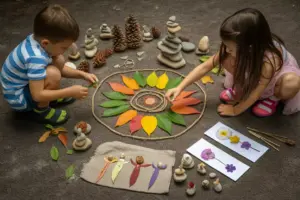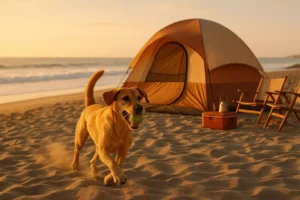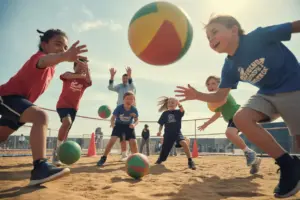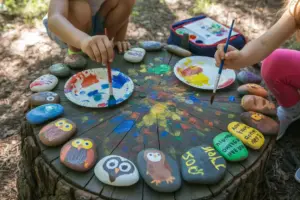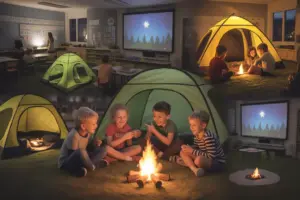Camping with Little Kids: Easy Games, Meals, and Routines for Success
Picture this: your toddler is giggling while catching fireflies, your preschooler is proudly helping set up camp, and everyone is enjoying a peaceful evening under the stars. Camping with little kids doesn’t have to be chaotic – with the right preparation and mindset, it can become your family’s most treasured tradition. While many parents worry about how to make camping with kids fun, especially with toddlers in tow, the secret lies in simple planning, age-appropriate activities, and flexible routines that work for the whole family.
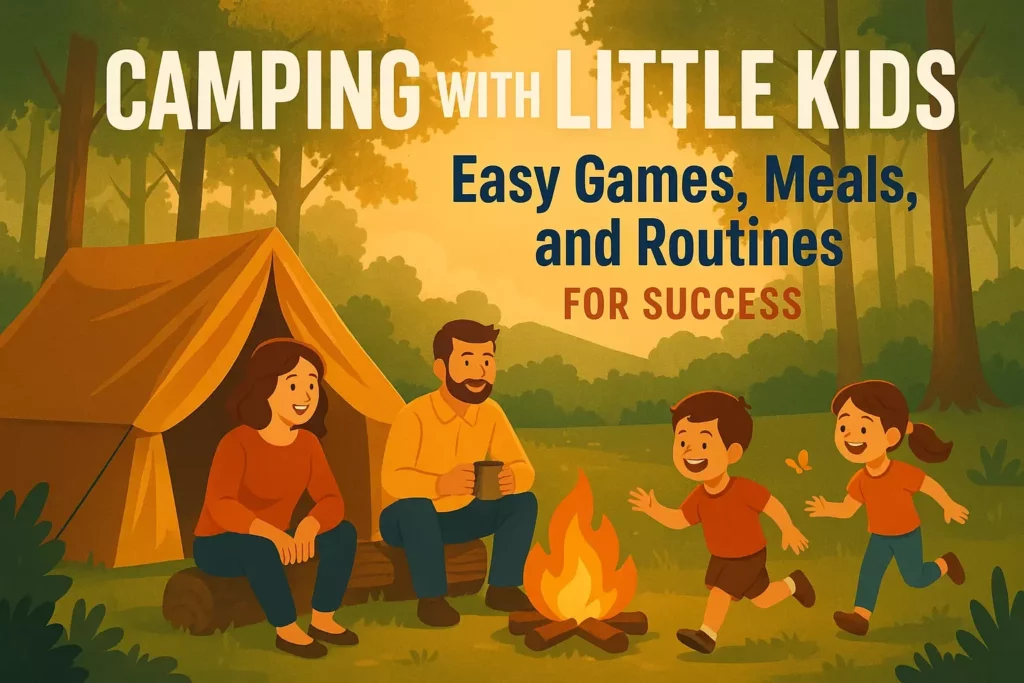
Key Takeaways
- Start small with nearby campgrounds and short trips to build confidence and identify what works for your family
- Plan age-appropriate activities like nature scavenger hunts, simple crafts, and interactive games that keep little ones engaged
- Prepare easy, kid-friendly meals that require minimal cooking and cleanup while still being nutritious and satisfying
- Establish flexible routines that maintain some structure while allowing for the spontaneity that makes camping magical
- Pack strategically with safety essentials, comfort items, and entertainment that doesn’t rely on screens
Why Camping with Young Children Is Worth the Effort
Camping offers unique benefits that hotel stays simply can’t match. Children develop independence, problem-solving skills, and a deep connection with nature. Research shows that outdoor experiences boost creativity, reduce stress, and improve physical health in children. For families, camping creates uninterrupted bonding time away from daily distractions.
The key to successful family camping lies in understanding that camping with toddlers and young children requires a different approach than adult-only trips. Flexibility becomes your best friend, and success is measured by smiles and memories rather than perfectly executed plans.
Essential Preparation: Setting the Foundation for Fun
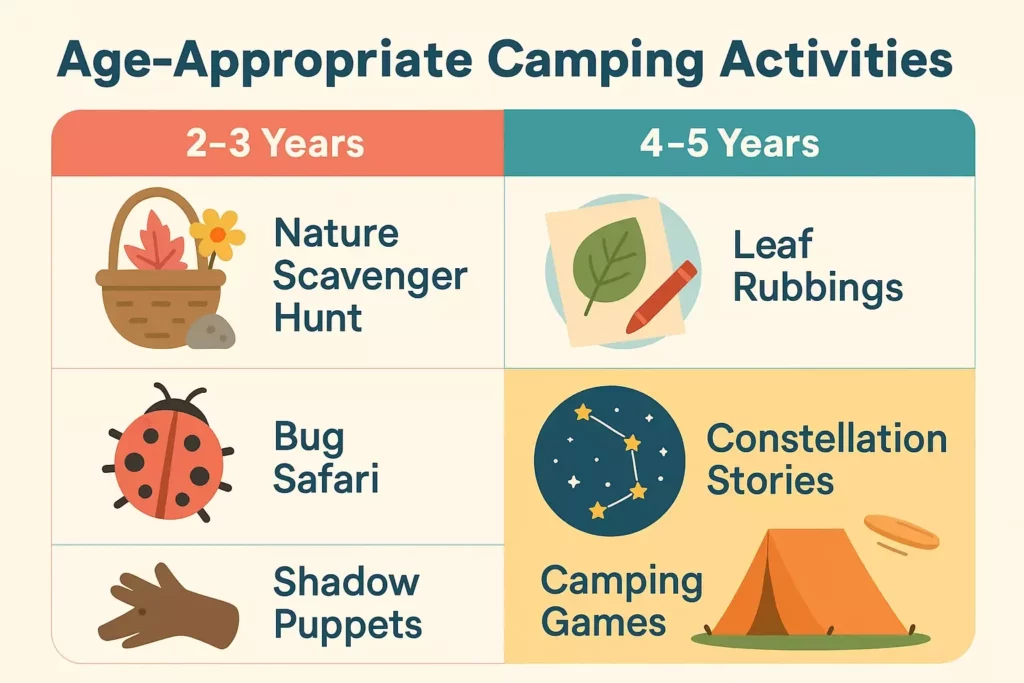
Choosing the Right Campground
Location matters tremendously when camping with little kids. Look for campgrounds that offer:
- Clean restroom facilities within walking distance
- Playground areas or designated play spaces
- Swimming opportunities like lakes or pools
- Level camping sites that are easy to navigate with strollers
- Camp store for forgotten essentials
Start with state parks or KOA campgrounds, which typically offer family-friendly amenities and maintain high cleanliness standards. Avoid remote wilderness camping until children are older and more adaptable.
Timing Your Trip
Weather and season selection can make or break a family camping experience. Spring and fall often provide the most comfortable conditions, with fewer bugs and moderate temperatures. Plan shorter trips initially – even one night can feel like a grand adventure to a toddler.
Consider your children’s natural rhythms. If your toddler is an early riser, embrace morning activities like nature walks and bird watching. Evening activities should wind down before normal bedtime to maintain some routine.
Age-Appropriate Games and Activities
Nature-Based Games for Toddlers (Ages 2-4)
Simple observation games work wonderfully for this age group:
🔍 Nature Color Hunt
Give toddlers a simple color chart and have them find natural items matching each color. Red leaves, brown pinecones, green grass – this activity develops observation skills while keeping little hands busy.
🐛 Bug Safari
Provide magnifying glasses and encourage gentle observation of insects and small creatures. Create excitement by making “discovery announcements” when someone spots something interesting.
🎵 Animal Sound Game
Take turns making animal sounds and guessing which forest creature makes each noise. This game works perfectly during quiet times in the tent or around the campfire.
Engaging Activities for Preschoolers (Ages 4-6)
More complex games suit this age group’s developing cognitive abilities:
📝 Camping Scavenger Hunt
Create a picture-based scavenger hunt featuring common camping items: tent, campfire, picnic table, hiking boots. This activity encourages exploration while teaching camping vocabulary.
🏗️ Nature Building Challenges
Challenge kids to build fairy houses using sticks, leaves, and stones. Set simple goals like “tallest tower” or “most colorful creation” to add friendly competition.
⭐ Constellation Stories
Teach simple star patterns and encourage children to create their own stories about the constellations. This nighttime activity creates magical memories while introducing basic astronomy.
Rainy Day Entertainment
Weather backup plans prevent disappointment and keep the fun going:
- Card games like Go Fish or Old Maid
- Travel-sized board games designed for camping
- Story creation where each person adds one sentence
- Indoor scavenger hunts within the tent or cabin
- Simple craft projects using collected natural materials
Simple, Kid-Friendly Camping Meals
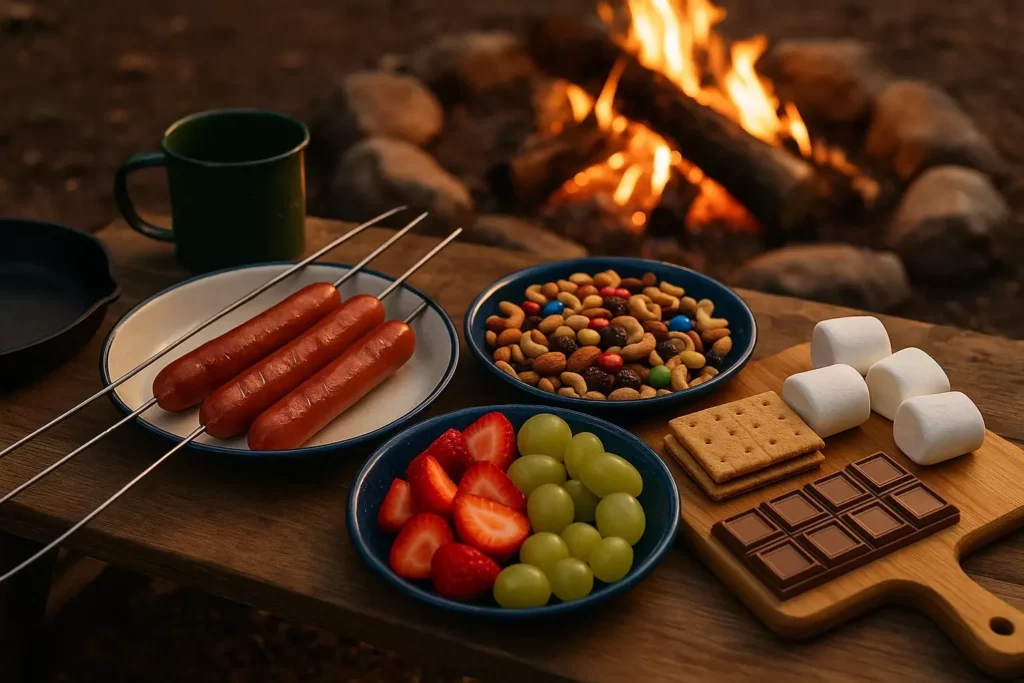
Breakfast Solutions That Work
Morning meals should be filling, easy to prepare, and appealing to young palates:
🥞 Make-Ahead Pancake Mix
Pre-mix dry ingredients at home and store in labeled bags. At camp, just add water and cook on a camp stove or griddle. Top with fresh berries found during morning nature walks.
🍌 Banana Boat Breakfast
Slice bananas lengthwise, stuff with granola and mini chocolate chips, wrap in foil, and warm by the campfire. Kids love the interactive preparation and sweet results.
🥚 Campfire Breakfast Burritos
Scramble eggs with cheese and pre-cooked sausage, wrap in tortillas, and warm in foil packets. These can be prepared partially at home for easier camp cooking.
For more detailed campfire cooking techniques, explore traditional methods that work well with family meals.
Lunch Ideas for Active Days
Midday meals need to be portable and energizing:
| Meal Option | Prep Time | Kid Appeal | Portability |
|---|---|---|---|
| Trail Mix Wraps | 5 minutes | ⭐⭐⭐⭐ | Excellent |
| Camping Quesadillas | 10 minutes | ⭐⭐⭐⭐⭐ | Good |
| PB&J Sandwiches | 3 minutes | ⭐⭐⭐⭐⭐ | Excellent |
| Fruit and Cheese Boxes | 5 minutes | ⭐⭐⭐ | Excellent |
Dinner Favorites for Family Bonding
Evening meals create opportunities for family connection:
🌭 Campfire Hot Dogs
Classic for a reason – kids can help roast their own hot dogs while adults prepare sides. Offer various toppings to encourage trying new flavors.
🍝 One-Pot Pasta
Cook pasta with sauce, vegetables, and protein in a single camping pot. This method minimizes cleanup while maximizing nutrition and taste.
🌮 Taco Bar
Set up a DIY taco station with pre-cooked meat, beans, cheese, and vegetables. Children enjoy building their own meals, and parents appreciate the customization options.
Snack Strategies
Strategic snacking prevents meltdowns and maintains energy:
- Trail mix with nuts, dried fruit, and a few chocolate pieces
- Fresh fruit that travels well (apples, oranges, grapes)
- Cheese sticks and crackers for protein
- Granola bars for quick energy boosts
- Veggie chips as a healthier alternative to regular chips
Establishing Camping Routines That Work
Morning Routines for Success
Consistent morning structure helps children feel secure in the new environment:
- Wake-up and bathroom routine (same as home)
- Simple breakfast with minimal cleanup
- Getting dressed in weather-appropriate clothing
- Morning nature walk to explore the campground
- Planning the day with input from kids
Keep mornings relaxed and unhurried. Camping is about slowing down and enjoying simple pleasures, not maintaining the same pace as busy weekdays.
Afternoon Activity Balance
Energy management becomes crucial during long camping days:
Active Time Blocks:
- Hiking short, easy trails
- Swimming or water play
- Playground time
- Nature exploration games
Quiet Time Blocks:
- Reading in the shade
- Nap time for younger children
- Quiet crafts or drawing
- Rest and snack breaks
Transition activities help move between high and low energy periods. Simple songs, stretching, or brief walks signal activity changes to young children.
Evening Wind-Down Strategies
Bedtime routines require special attention when camping:
6:00 PM – Dinner preparation (involve kids in age-appropriate tasks)
7:00 PM – Cleanup and evening activities (games, stories)
7:30 PM – Quiet time (reading, gentle conversation)
8:00 PM – Bedtime routine (teeth brushing, pajamas, comfort items)
8:30 PM – Lights out (adjust based on your family’s normal schedule)
Maintain familiar elements like favorite stuffed animals, bedtime stories, or special songs. These comfort items help children feel secure in the unfamiliar camping environment.
Safety Considerations and Practical Tips
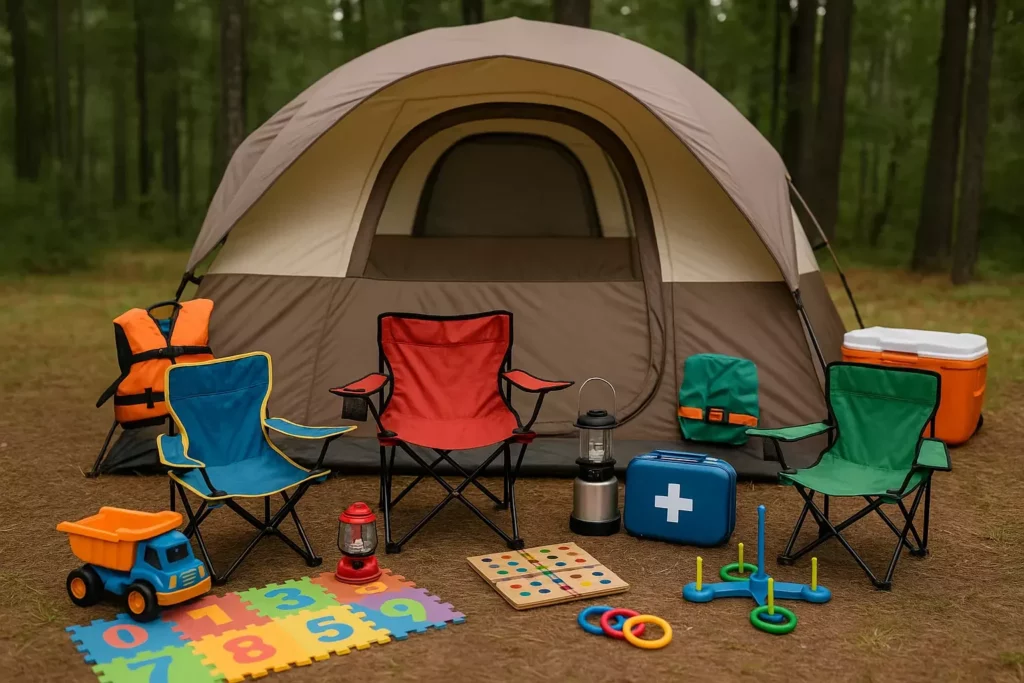
Essential Safety Preparations
Child safety requires extra attention in outdoor environments:
🚨 Emergency Preparedness
Ensure your first aid kit includes pediatric medications, bandages in fun colors, and any prescription medications your children need.
🔦 Visibility and Identification
Provide each child with a whistle and ensure they know your campsite number. Consider temporary tattoos with your phone number for extra security.
🌊 Water Safety
Never leave children unattended near water sources. Even shallow streams can be dangerous for toddlers. Establish clear boundaries and supervise all water activities closely.
Packing Essentials for Little Ones
Strategic packing makes camping with kids much more manageable:
Clothing Considerations:
Pack extra clothes – plan for at least two complete outfit changes per day. Include weather-appropriate layers and rain gear for unexpected weather changes.
Comfort Items:
- Favorite blankets or stuffed animals
- Familiar pillows or pillowcases
- Special cups or plates from home
- Comfort snacks for difficult moments
Entertainment Supplies:
- Coloring books and crayons
- Small toys that won’t get lost easily
- Books for quiet time
- Bubbles for instant entertainment
Learn more about efficient packing strategies that work well for family trips.
Sleep Solutions for Young Campers
Quality sleep makes or breaks family camping experiences:
Tent Setup Considerations:
Choose a family-sized tent with enough space for everyone to sleep comfortably. Practice setting up at home so children know what to expect.
Sleeping Arrangements:
- Use appropriate sleeping bags rated for expected temperatures
- Bring familiar bedding when possible
- Consider portable night lights for midnight bathroom trips
- Pack extra blankets for temperature fluctuations
Creating Lasting Memories
Photography and Documentation
Capture the magic without letting documentation overwhelm the experience:
- Give older children disposable cameras or kid-friendly digital cameras
- Create a camping journal with drawings and simple writing
- Collect small natural souvenirs (where permitted)
- Take photos of children engaged in activities, not just posed shots
Building Family Traditions
Establish special camping traditions that children will anticipate and remember:
- Special camping songs sung around the campfire
- First and last day rituals like special meals or activities
- Nature collection projects that continue from trip to trip
- Camping achievement badges for new skills learned
Teaching Outdoor Skills
Age-appropriate skill building creates confidence and engagement:
For Toddlers:
- Identifying basic plants and animals
- Following simple safety rules
- Helping with easy camp tasks
For Preschoolers:
- Basic survival skills like staying on trails
- Understanding water safety basics
- Learning Leave No Trace principles
🏕️ Family Camping Checklist Generator
Create a personalized packing checklist based on your family’s needs
Troubleshooting Common Challenges
Dealing with Meltdowns and Difficult Moments
Every family camping trip will have challenging moments. Preparation and patience make the difference between minor bumps and trip-ending disasters:
Prevention Strategies:
- Maintain regular meal and snack schedules
- Recognize early signs of tiredness or overstimulation
- Have quiet activities ready for overwhelming moments
- Keep comfort items easily accessible
In-the-Moment Solutions:
- Remove the child from stimulating situations
- Offer choices between two acceptable options
- Use distraction techniques like counting games or songs
- Remember that fresh air and exercise often improve moods quickly
Weather-Related Adjustments
Flexibility with weather changes keeps trips enjoyable:
Rainy Day Strategies:
- Set up covered areas using tarps
- Move activities into larger tents or camp shelters
- Embrace puddle jumping and rain exploration (with proper gear)
- Have indoor games and activities prepared
Hot Weather Adaptations:
- Plan active time for early morning and evening
- Create shade using tarps or canopies
- Increase water intake and offer frequent breaks
- Adjust expectations for midday activities
Sleep Disruptions and Solutions
Night-time challenges often concern parents most:
Common Sleep Issues:
- Unfamiliar sounds and environment
- Temperature fluctuations
- Excitement preventing sleep
- Fear of darkness or wildlife
Practical Solutions:
- Bring white noise apps or small fans
- Layer bedding for temperature control
- Establish calming bedtime routines
- Use battery-powered night lights
- Practice tent sleeping at home before the trip
Advanced Tips for Experienced Family Campers
Involving Kids in Planning
Engagement starts before leaving home. Include children in age-appropriate planning activities:
- Let them choose one special snack or meal
- Research campground activities together
- Practice setting up equipment at home
- Create anticipation through countdown calendars
- Allow input on activity choices and timing
Building Independence Gradually
Skill development happens naturally during camping:
Age 2-3: Simple tasks like carrying their own small backpack
Age 4-5: Helping with tent setup and meal preparation
Age 6-8: Learning basic outdoor safety and navigation
Age 9+: Taking responsibility for their own gear and helping younger siblings
Creating Educational Opportunities
Learning happens naturally in outdoor environments:
- Science lessons through nature observation
- Math practice through measuring, counting, and cooking
- Geography skills through map reading and navigation
- Life skills through problem-solving and adaptability
- Environmental awareness through Leave No Trace principles
Explore additional family camping activities that combine fun with learning opportunities.
Conclusion
Camping with little kids transforms from daunting to delightful when approached with realistic expectations and proper preparation. The key to making camping with kids fun, especially with toddlers, lies in embracing flexibility, planning age-appropriate activities, and focusing on connection rather than perfection.
Start small, stay flexible, and celebrate the small victories – like a toddler’s first successful tent entry or a preschooler’s excitement over finding the perfect walking stick. These moments become the foundation for a lifetime love of outdoor adventures.
Your next steps:
- Choose a nearby campground for your first family trip
- Practice setting up gear at home with the kids
- Plan one special activity that matches your children’s interests
- Pack comfort items alongside camping essentials
- Set realistic expectations and prepare for unexpected moments
Remember, the goal isn’t a perfect camping experience – it’s creating joyful memories and fostering a love for nature that will last a lifetime. Every family’s camping style is different, and what works for others may need adjustment for your unique situation. Trust your instincts, stay patient, and embrace the adventure of discovering the outdoors together.
The wilderness is waiting, and your children are ready for the magic that only camping can provide. Start planning your family’s next outdoor adventure today – the memories you create will become treasured stories shared for generations to come.

